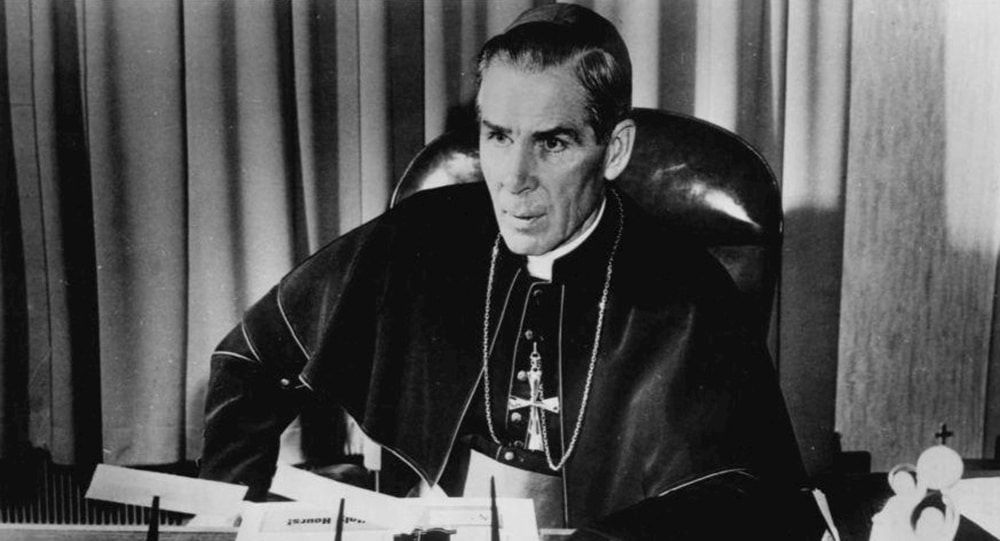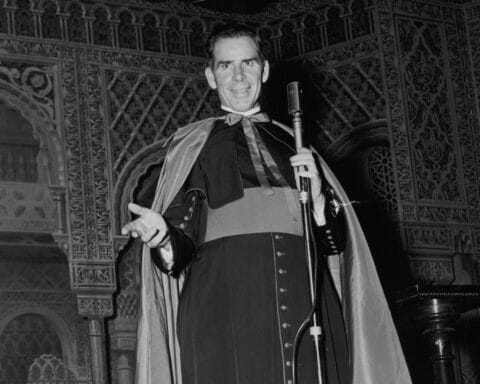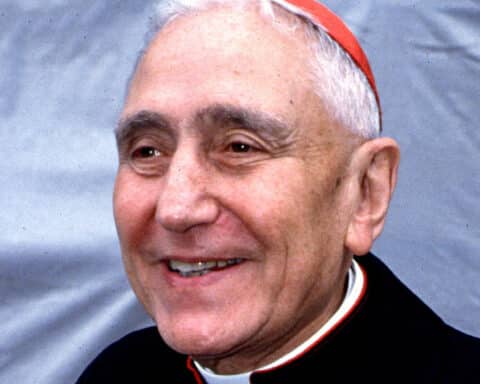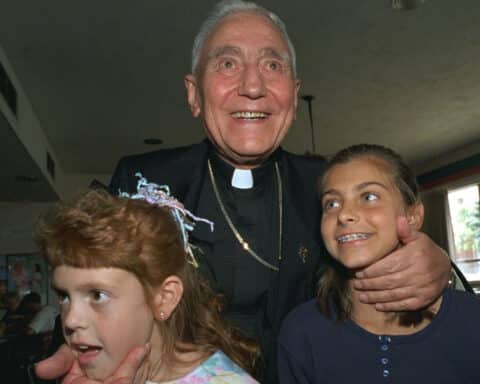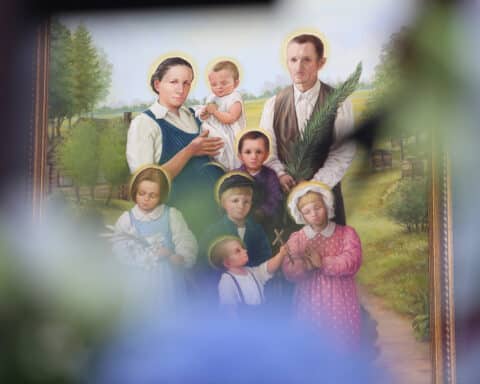The Dec. 3 postponement of Venerable Archbishop Fulton J. Sheen’s Dec. 21 beatification, less than three weeks ahead of time, left the faithful shocked, disappointed and saddened. It had promised to be a unifying event for American Catholics and an opportunity to celebrate a holy bishop in a time of high-profile episcopal scandals. Instead, it turned into an embarrassing affair that runs the risk of calling into question certain aspects of the Faith, particularly where the sainthood process is concerned.
Aside from imparting a sense of gravity owing to its timing, the postponement was accompanied by no explanation. Such behavior rings uncomfortably and unfortunately familiar, further damaging the Church’s credibility in a time when leaders have struggled to be honest and transparent with the faithful amid the seemingly perpetual clergy sex abuse crisis and more.
Confusion reigns
A slow release of documents and reports from various sources has detailed that the postponement originated with Bishop Salvatore Matano of Rochester, New York, where Sheen once served briefly as diocesan bishop. In a Dec. 5 statement, the Diocese of Rochester acknowledged its central role in calling for the delay and said it was not brought about because of any allegations of abuse related to Sheen personally, but because it wanted to allow for “a further review of his role in priests’ assignments.” This appears to refer to some specific cases of Sheen’s management of clergy-abusers, which Rochester thought deserved closer scrutiny.
Only after two full, independent investigations into the concerns raised by Bishop Matano were conducted by both the Diocese of Peoria and the Holy See — both of which exonerated Sheen of any mishandling or endangerment of children — was the beatification scheduled by the Congregation for the Causes of Saints. For reasons unknown, however, the Diocese of Rochester continued pressing for a postponement, this time reportedly enlisting the help of two American cardinals to make their case to Rome. And this time, it prevailed. But why push again if Rochester’s stated concerns about Sheen had been put to rest? A bombshell op-ed, written by Msgr. James Kruse in Peoria and posted online Dec. 7, testifies that the Diocese of Rochester has attempted to delay the beatification repeatedly and even calls into question the integrity and timing of such efforts.
Given all of this, is it any wonder that confusion reigns? Without clear, forthright communication on the exact reasons behind the delay, the faithful are left bewildered at best, or with damaged faith at worst. The lack of communication has allowed speculation, gossip and rumors to run wild, especially on social media, and — even worse — has cast a shadow over Sheen’s life and ministry. It also has called into question the integrity and thoroughness of the investigatory process preceding beatifications.
| NOVENA FOR THE CAUSE OF ARCHBISHOP SHEEN |
|---|
|
In response to the postponement of the beatification of Fulton J. Sheen, Bishop Daniel Jenky of the Diocese of Peoria has asked the faithful to participate in a special nine-day novena to “petition God unceasingly” that the cause may move forward to the beatification and canonization of Fulton Sheen.
The nine-day novena will start on Dec. 12, the feast of Our Lady of Guadalupe, and include daily meditations on reflections from Fulton Sheen. For more information, visit celebratesheen.org/novena |
Weighing the options
One line of speculation suggests that the delay is related to an imminent report on clergy sex abuse, covering the state’s eight dioceses, anticipated from New York’s attorney general. Bishop Matano and others reportedly could fear the appearance of Sheen’s name in the report, and that its release might have been timed to coincide with the scheduled beatification — though Rochester’s Dec. 5 statement does not mention the forthcoming report at all. Given this, one might reasonably consider it prudent to wait until the report has been released before moving ahead with a beatification. Some commentators endorse the idea of slowing the beatification if it could potentially harm the Church.
One of the problems with that thinking, though, is that it sets up some unsettling precedents. Does the Church want to be in the position of capitulating or making concessions to the state in matters of faith? Furthermore, if postponing the beatification comes as a result of an impending attorney general’s report, what exactly do we fear? A generic appearance of Sheen’s name related to what Church authorities have already investigated? If that is the case, the Church could become paralyzed when it comes to advancing Sheen’s cause — or that of others — because of such a fear and any related outcomes.
Alternatively, we also are left asking the question: Is there new information that could call into question Sheen’s beatification? If there is some new, damning information, the faithful deserve to be told.
But if it is true that all concerns have been investigated and that those investigations exonerate Sheen, then the beatification should be scheduled once again, accompanied by an articulate explanation of the postponement.
Underscoring all of this is that the delay of Fulton Sheen’s beatification shapes a false understanding of what beatification really means. The Church does not teach that saints lived perfect lives, but rather that they were sinners who acknowledged and confronted their weaknesses and flaws. If there are indeed no concerns about Sheen, Church authorities should be unafraid to prove their case as to why they have determined there is reasonable hope he is in heaven and move forward with the beatification. Failing to do so can’t help but provoke questions of ulterior motives or bring about greater scandal.
Does the Church want to risk prohibiting future beatifications similarly because of a fear of a person’s past failings? If nothing else, perhaps this is a missed opportunity to proclaim the truth of God’s grace and mercy, and to catechize the world on what it means for the Church to recognize that an individual has been beatified or canonized.
The matter of the miracle
Even if there is something improper about Sheen’s administrative actions that Rochester, for whatever reason, is not sharing publicly at this time, there is the not-so-small issue of the proven miracle attributed to Sheen’s intercession with God. This miracle, approved by Pope Francis on July 5, allowed Sheen’s beatification cause to turn a corner that can’t really be reversed. Hesitancy to beatify Sheen now only will raise questions about approved miracles, their relevancy and what they portend.
The miracle itself, which is understood by believers as evidence of one’s heavenly citizenship, is what beatification hinges upon. Beatification is not an ultimate prize, tribute or accolade, but a public recognition of reasons to believe a person is in heaven based on investigated evidence. The entire canonization process is meant to verify the intuition of the faithful who have shown veneration for the candidate, found inspiration in their lives and witnessed God’s action through his or her intercession.
The Church doesn’t make saints; it discerns God’s action in the life of the saint and in the world. A delay in acting on the evidence of the miracle, demonstrated by a postponement of Sheen’s beatification, combined with the absence of clear, evidenced reasons for the delay, only gives fertile ground for scandal and confusion. Further scrutiny of Sheen’s life and work, if deemed necessary, can take place before a future canonization.
As it stands, the way Sheen’s beatification was postponed appears damaging, irresponsible and unjust. It is another occasion where Church leaders have failed to be transparent, and it is a missed opportunity for them to safeguard the Church’s faith — as is their sacred duty — rather than to give believers a reason to call it into question.
Michael R. Heinlein is editor of OSV’s Simply Catholic. He writes from Indiana.

